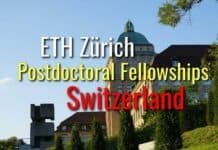PhD Studentship: Chemical Ecology: This PhD studentship offers an exciting opportunity to explore the ecological interactions between herbivorous insects, plants, fungi, and parasitoids, with a focus on chemical cues in pest management. Hosted by Rothamsted Research in collaboration with the University of Bristol, this project seeks to develop innovative pest management strategies by leveraging entomopathogenic fungi to improve aphid biocontrol using natural enemy parasitoids.
PhD Studentship: The Role of Endophytic Entomopathogenic Fungi on Pest-Host-Parasitoid Interactions: A Chemical Ecology Perspective
Designation:
PhD Studentship
Research Area:
Chemical Ecology, Entomology, Microbiology, Agricultural Science
Location:
Rothamsted Research, Harpenden, UK
University of Bristol, UK
Eligibility/Qualification:
Candidates should possess a background in biology, ecology, entomology, microbiology, or related fields. Experience in experimental design, chemical analysis, or ecological interactions is advantageous but not required. The program is open to students from diverse backgrounds and supports flexible study arrangements for those with significant personal circumstances, disabilities, or caregiving responsibilities.
Job Description:
The PhD candidate will investigate chemical cues in pest-host-parasitoid interactions, particularly focusing on how endophytic entomopathogenic fungi affect aphid behavior and fitness, as well as the fitness of their parasitoid wasps. The research will involve:
- Behavioral studies on aphid and parasitoid olfactory preferences.
- VOC collection from inoculated plants using advanced techniques like gas chromatography-mass spectrometry.
- Electrophysiological analysis to identify detectable VOCs and synthetic blend testing.
- Assessing non-lethal effects of fungi-inoculated plants on parasitoid wasps to understand their impact on biocontrol effectiveness.
The project provides comprehensive training in hypothesis-driven research, statistical analysis, laboratory techniques, and scientific communication, with guidance from a team of experienced ecologists, microbiologists, and chemists at Rothamsted Research and the University of Bristol.
How to Apply:
Submit applications through the University of Bristol’s admissions portal. For additional information or discussions regarding reasonable project adaptations, candidates are encouraged to contact the PhD project supervisor.
Last Date to Apply:
Until position filled









